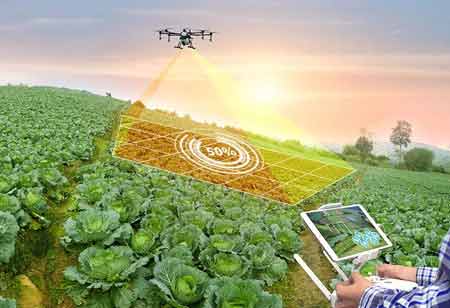

Thank you for Subscribing to Agri Business Review Weekly Brief

Precision agriculture, with the help of technology, is allowing farmers to solve a wide range of problems and improve yield production, crop quality, and profitability.
Precision agriculture systems are continuously developing management systems and helping farmers solve a whole spectrum of challenges. On the other hand, precision agriculture includes a variety of tools that growers need to master to extract the most out of their production. Precision farming uses modern technologies like satellite imagery or field mapping to enhance crop quality and profitability. Moreover, it optimises traditional resource usage. Therefore, this agricultural management system contributes to the development of sustainable agriculture by solving both economic and ecological problems, which are becoming more acute. Among the technologies used in these systems are GPS, drones, and satellite images. Based on the data, farmers receive information on all key matters, including crop status and the weather forecast, environmental changes, etc. Moreover, a crucial difference between precision farming and traditional agriculture is the ability to manage fields by dividing them into separate areas rather than a single block. Such zoning allows diversifying management decisions for individual field parts, such as adjusting the fertiliser amount, optimising technique movement, and using fuel more frugally. Farmers can control every process remotely with a precision agriculture system. Even small farms can manage large areas or a group of small fields. It radically improves the efficiency of crops and saves costs by increasing vehicle production. The last aspect is essential as precision agriculture technologies are seemingly expensive. However, the savings are significantly higher than with traditional agricultural methods in the long run. Therefore, growers can accurately sum the required fertiliser amount and determine the most effective fertiliser types for a particular field. The importance of precision farming technologies is that they improve agricultural operation planning for an extended period, adjusting the real-time strategy during force majeure. Optimising the soil's use preserves its quality, facilitating a stable food supply. Therefore, precision farming in agriculture plays an integral role in solving the global problem of hunger. Precision agriculture is helpful for growers and the environment. Moreover, these domains are interconnected as environmental degradation exacerbates agricultural conditions. Some of the advantages of a control system include lowering the cost of material resources such as water, seeds, and fuel; managing soil health by reducing the number of pesticides used; reducing agriculture's reliance on weather conditions, and increasing the realisation of the genetic potential of the crops produced. These advantages of precision farming allow farmers to improve the products’ quality while reducing their costs. The goal of sustainable agriculture is to meet the current society's needs, such as food, without endangering the environment. Precision agriculture conserves resources by enabling farmers to cultivate crops and soil with maximum efficiency. For example, VRT reduced the reliance of production on chemicals, contributing to the long-term productivity of the field. Optimisation of transport costs alleviates hazardous substance emissions into the atmosphere. Therefore, precision sustainable agriculture is the most advanced farming system, allowing for solving both production and socially significant issues, including global ones. Precision agriculture solutions enable growers to solve these challenges, regardless of production scale.